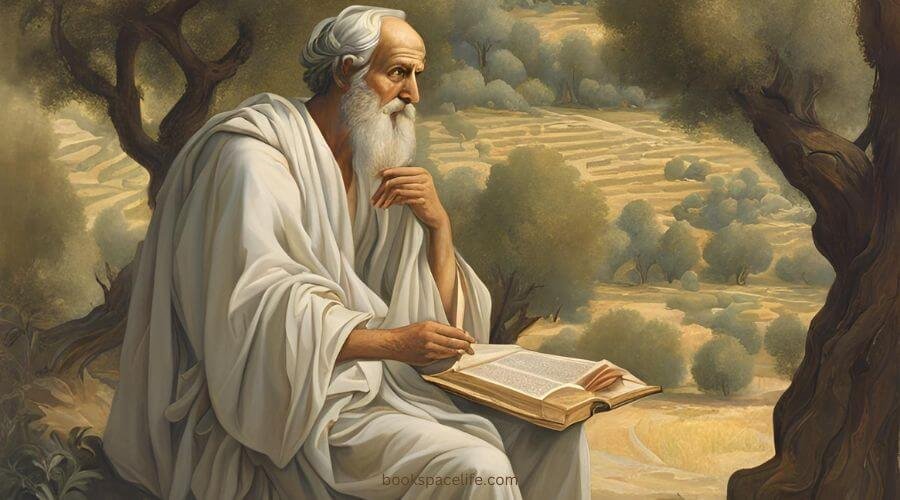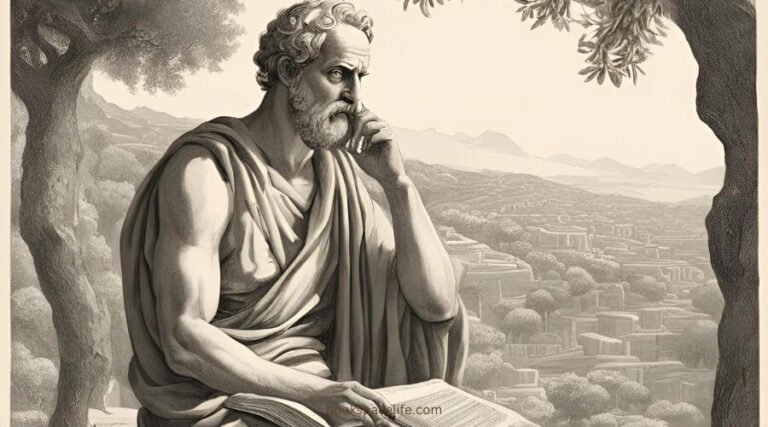Thales of Miletus
Xenophanes : The Philosopher of Change and Critique
Xenophanes of Colophon (570 – 475 BCE) was a pre-Socratic philosopher, poet, and religious critic whose ideas challenged the conventional beliefs of his time.
Renowned for his reflections on the nature of divinity and the limits of human knowledge, Xenophanes is often regarded as one of the earliest philosophers to advocate for a more abstract and monotheistic understanding of the divine.
His work not only laid the groundwork for later philosophical inquiries but also contributed to the development of epistemology (nature, origin and limits of knowledge) and ethics (moral principles).
This blog post explores Xenophanes’s life, travels, early education, philosophical contributions, and his lasting influence on Western thought.
Quick Read
Table of Contents
(1) Life and Historical Context
Xenophanes was born in Colophon, an Ionian city on the western coast of Asia Minor (modern day Turkey), around 570 BCE.
The specific details of his early life are somewhat obscure, but it is believed that he came from a wealthy family, which likely provided him with a solid education.
Colophon was known for its vibrant intellectual atmosphere, and Xenophanes would have been influenced by the philosophical inquiries that permeated the region.
In his youth, Xenophanes began to develop his philosophical ideas and critiqued the traditional religious practices of the Greeks.
While the exact nature of his early education is not well-documented, it is clear that he was exposed to the ideas of earlier philosophers, such as Thales and Heraclitus, as well as the epic poetry of Homer and Hesiod, which shaped the cultural and religious beliefs of ancient Greece.

(2) Travels and Philosophical Development
Throughout his life, Xenophanes traveled extensively, seeking knowledge and engaging with different cultures.
His journeys took him to various regions of the Greek world, including Egypt and Persia, where he encountered diverse religious and philosophical traditions. These experiences profoundly influenced his thinking and contributed to his critique of conventional beliefs.
Xenophanes’s travels allowed him to witness the contradictions inherent in the anthropomorphic depictions of gods found in Greek mythology.
His exposure to different cultures and their religious practices led him to question the nature of divinity and the ways in which humans understood and represented the divine.
(3) Philosophical Contributions
Xenophanes is best known for his critiques of traditional Greek religion and his contributions to metaphysics and epistemology. His philosophical ideas can be summarized in several key themes:
- Critique of Anthropomorphism: One of Xenophanes’s most significant contributions was his critique of the anthropomorphic representations of the gods in Greek mythology.
He argued that the gods were often depicted in human form and exhibited human flaws, such as jealousy and deceit.
In his view, this anthropomorphism was a reflection of human ignorance and limited understanding.
He famously stated, “If horses or oxen could draw, they would depict their gods as horses or oxen.” This assertion emphasized the idea that deities should not be limited to human characteristics and that true divinity transcends human experience.
- Concept of a Singular Divine Being: In contrast to the polytheistic beliefs prevalent in Greek society, Xenophanes proposed the idea of a singular, all-powerful deity.
He described this divine being as eternal, unchanging, and unlike humans in both form and thought.
This concept of a transcendent god laid the groundwork for later philosophical and theological developments, influencing the monotheistic traditions that would emerge in subsequent centuries.
- Epistemology and the Limits of Human Knowledge: Xenophanes was also concerned with the nature of knowledge and the limitations of human understanding.
He believed that human perceptions are inherently flawed and that our knowledge of the divine and the cosmos is limited.
He asserted that people often accept beliefs based on subjective experience rather than objective truth.
This skepticism regarding human knowledge paved the way for later philosophical inquiries into epistemology, influencing thinkers such as Socrates, Plato, and Aristotle.
- Philosophy of Change and Flux: While Xenophanes acknowledged the existence of change and flux in the world, he believed in the underlying permanence of the divine.
His thoughts on change contrast with those of Heraclitus, who emphasized the constant flux of existence.
Xenophanes argued that while the physical world may be in a state of constant change, the divine remains constant and unchanging, providing stability in an otherwise chaotic universe.
- Ethics and the Nature of Justice: Xenophanes also addressed ethical questions, emphasizing the importance of virtue (high moral standards) and the pursuit of knowledge.
He believed that true wisdom involves recognizing the limitations of human understanding and striving for moral excellence.
His ideas on ethics were revolutionary for his time, as they encouraged individuals to question societal norms and seek a deeper understanding of justice and virtue.

(4) Influence and Impact
Xenophanes’s contributions to philosophy had a profound impact on subsequent thinkers and the development of Western thought. His critiques of traditional religion and his exploration of metaphysical questions laid the groundwork for later philosophical inquiries.
- Influence on Later Philosophers: Xenophanes’s ideas influenced a wide range of philosophers, including Socrates, Plato, and Aristotle.
His critique of anthropomorphism and the notion of a singular divine being resonated with later monotheistic philosophies, contributing to the development of religious thought in Western traditions.
- Foundation for Skepticism: Xenophanes’s skepticism regarding human knowledge and perception paved the way for later philosophical inquiries into epistemology.
His belief in the limitations of human understanding resonated with the skeptical traditions that emerged in ancient Greece, influencing thinkers like Pyrrho and Sextus Empiricus.
- Impact on Religious Thought: Xenophanes’s rejection of polytheism and his advocacy for a singular deity had a lasting influence on the development of monotheistic religions, particularly Judaism, Christianity, and Islam.
His ideas contributed to the broader discourse on the nature of divinity and the relationship between humanity and the divine.
- Cultural and Historical Significance: Xenophanes’s life and work reflect the rich intellectual culture of ancient Greece, characterized by a quest for knowledge and a willingness to challenge established beliefs.
His contributions represent a pivotal moment in the history of human thought, marking a transition from mythological explanations of the world to rational, systematic inquiries.
- Legacy in Philosophy and Education: Xenophanes’s philosophical ideas became part of the broader curriculum of ancient philosophical education.
His emphasis on questioning received wisdom and seeking truth encouraged a culture of inquiry and critical thinking that would characterize later philosophical traditions.
- Recognition of Change and Stability: The tension between change and stability in Xenophanes’s thought continued to resonate in later philosophical discussions.
His recognition of the impermanence of the physical world, juxtaposed with the unchanging nature of the divine, influenced subsequent metaphysical inquiries into the nature of existence and the cosmos.
(5) Conclusion
Xenophanes of Colophon stands as a significant figure in the history of philosophy, whose contributions to metaphysics, epistemology, and ethics have shaped Western thought for centuries.
His critiques of anthropomorphic representations of the divine and his advocacy for a singular, transcendent god represent a radical departure from the religious beliefs of his time.
Through his reflections on the nature of knowledge and the limitations of human perception, Xenophanes laid the groundwork for future philosophical inquiries, inviting subsequent thinkers to explore the complexities of existence and the divine.
His legacy endures in contemporary discussions about the nature of belief, ethics, and the quest for knowledge, encouraging us to continue questioning our assumptions and seeking a deeper understanding of the world around us.
As we contemplate Xenophanes’s life and teachings, we are reminded of the power of human inquiry and the enduring quest for truth that characterizes the human experience.
His work serves as a testament to the transformative potential of philosophy, inspiring us to engage critically with our beliefs and to recognize the richness and complexity of existence.
(A) 7 Quick Facts on Xenophanes
- Born in Colophon – Xenophanes was born around 570 BCE in Colophon, an ancient Greek city (Ancient Ionia; modern-day Turkey)
- Traveled Extensively – He wandered throughout Greece and Italy, sharing his teachings.
- Criticized Polytheism – He questioned traditional Greek gods, criticizing anthropomorphic depictions.
- Pioneered Monotheistic Ideas – Xenophanes proposed a single, all-knowing god, unlike human form.
- Studied Philosophy and Poetry – He expressed his ideas through philosophical poems.
- Critic of Homer and Hesiod – Xenophanes argued their portrayals of gods were immoral.
- Influenced Eleatic School – His views inspired Parmenides and the Eleatic school’s focus on metaphysics.
(B) 10 Quotes attributed to Xenophanes
- One god, greatest among gods and men, neither in form nor thought like mortals. Proposing a singular, transcendent deity distinct from human characteristics.
- If horses or oxen had hands, or could draw with their hands, they would portray their gods. Highlighting how perceptions of the divine are shaped by cultural perspectives.
- The cosmos is the same for all; it is not the same for gods and men. Suggesting a shared universe that operates independently of divine whim.
- Mortals think that gods are born and have human senses. Critiquing anthropomorphism in religious beliefs.
- All things come from the earth, and all things return to the earth. Emphasizing a naturalistic view of existence and the cycle of life.
- The greatest part of wisdom is the ability to discern the truth. Valuing the pursuit of knowledge and truth as central to wisdom.
- He who knows has no need to speak. Indicating that true understanding is often best expressed through silence.
- Nothing is created or destroyed; everything is transformed. Expressing a view of reality rooted in change and transformation.
- The only thing I know is that I know nothing. Reflecting humility in the face of knowledge and understanding.
- All human beings are flawed, and our knowledge is limited. Acknowledging the imperfection of human perception and understanding.








